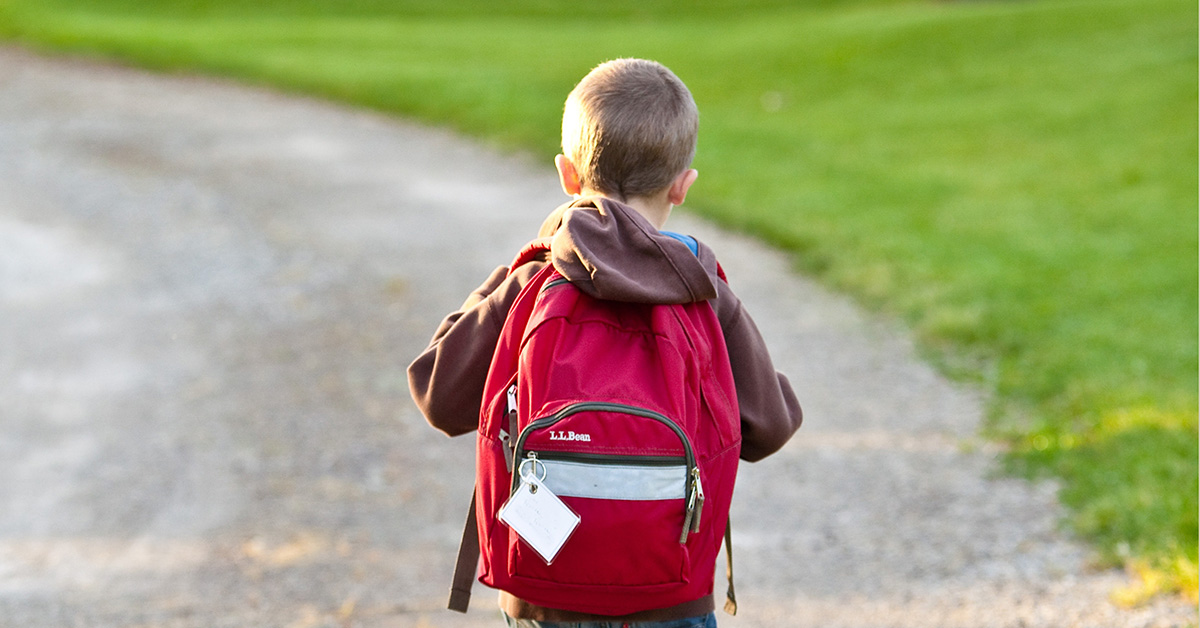Wakefield Offers Mental Health Tips to Help Children Return to the Classroom

For many children, heading back to school each year can be an exciting experience marked by entering a new grade or school, buying the latest clothes and catching up with friends. To others, the switch to the classroom is a time of stress and anxiety, especially with the increased chaos and uncertainty of the pandemic.
“I think it's really important to know how your child tends to respond to transitions,” Sarah Mallard Wakefield, M.D., said. “If they get really excited, that can be great. You can talk to them about how exciting it is to go back to school and seeing their friends and things like that. But if you see that your child is one who has some difficulty with transitions and tends to be more anxious, then I think that's a sign to do a little bit more preparation.”
Wakefield, chair for the Texas Tech University Health Sciences Center (TTUHSC) Department of Psychiatry, said preparing an excited child for the return to school can be as simple as talking about what the typical school day will look like: when they will get up, what clothes they may wear and what they will have for lunch. For children who may be more apprehensive about the new school year, she suggested several additional steps parents can take to ease their child’s concerns:
- Visit the school several days before classes begin. Something as ordinary as figuring out which door they're going to enter can be reassuring. Knowing beforehand what the hallways look like or which classroom they'll be in can help minimize some transitional struggles they might have during the first days or weeks back.
- Try to schedule a meeting with your child’s teacher before the first day of school. This can provide an opportunity for the teacher to address one-on-one with your child certain issues that may be causing your child to stress about returning for a new year.

Wakefield said anxieties could be compounded this year in particular due to the uncertainties that accompany COVID-19. What are the rules going to be and how am I going to be protected from COVID-19? Are my friends going to get sick? Will I get sick?
The pandemic, she added, definitely has caused an uptick in the level of anxiety and stress we all feel daily. Children may experience that uptick twice, first by thinking about it for themselves, and again in observing the circumstances and uncertainties with which their parents are struggling.
“I think this year, as opposed to last year for a lot of people, brings in additional anxiety,” Wakefield said. “Most children, especially kiddos in Texas, are going back to school in person. But the guidelines from the American Academy of Pediatrics and from the CDC talk about masking and I think there's a lot of questions about who's going to be wearing masks at school and who's vaccinated and kids are going to be struggling to answer those questions for themselves.”
Bullying also is something children may stress about, especially if they've experienced it before.
“Your child might be anxious or worried about it happening, or as it's happening, you might see that they are feeling more isolated and frustrated,” Wakefield said. “I think it's very important to regularly check in about your child's mental health and they can do this by first observing if they see any changes in their child and their mood or behavior.”
Wakefield believes it’s important for parents to periodically and consistently check in with their child's teacher to see how things are going during the typical school day and what they might be observing about your child in that domain. Perhaps then the parent and teacher can brainstorm together and develop a support system that can help the child at school and at home.
“There are lots of things that can be done just in the classroom to support a child and to say, ‘Hey, I recognize that you're not feeling great,’ or, ‘Can we check in and talk about this? I think you're doing a great job.’ But I do think sometimes we need to involve school counselors or the school administrators depending on what the setup is at the school,” Wakefield said.
Wakefield said there is a school-based mental health program facilitated from TTUHSC’s Department of Psychiatry. The program, known as CATR (Campus Alliance for Telehealth Resources) provides direct help for youth in fourth grade through 12th grade who are referred for consultation and evaluation. The program currently includes 88 independent school districts in the West Texas region and offers direct access to mental health care assessing youth who may be experiencing increased stress, anxiety, depression or other concerns.
When a counselor and a family are concerned about a child, Wakefield said they can make a referral to the CATR program and gain almost immediate access to a mental health team. The team will conduct assessments and set up sessions, as needed, with a child psychiatrist, child psychologist, licensed professional counselor or social worker.
“We really want to respond as quickly as possible,” Wakefield emphasized. “When we intervene early, we can intervene less and really prevent a child from struggling as much at school and at home.”
At the end of the day, Wakefield said it's important to remember that kids are really resilient, especially when they feel like they are seen, heard and supported. Most times they do get better and they do feel better. However, she stressed, it's equally as important to remember that most mental health conditions present before a child is 18, so more than 50% of the mental health conditions seen in adults initially presented during the person’s childhood.
“There are real struggles that kiddos have and real reasons to seek intervention,” Wakefield said. As a parent and a teacher and a child, you're always trying to figure out, ‘Am I responding to a stressor, and this too shall pass, or am I struggling with a mental health condition and I really need some appropriate treatment?’ That’s why we really want to make sure we're doing those assessments as early as possible to support our kids and families.”
